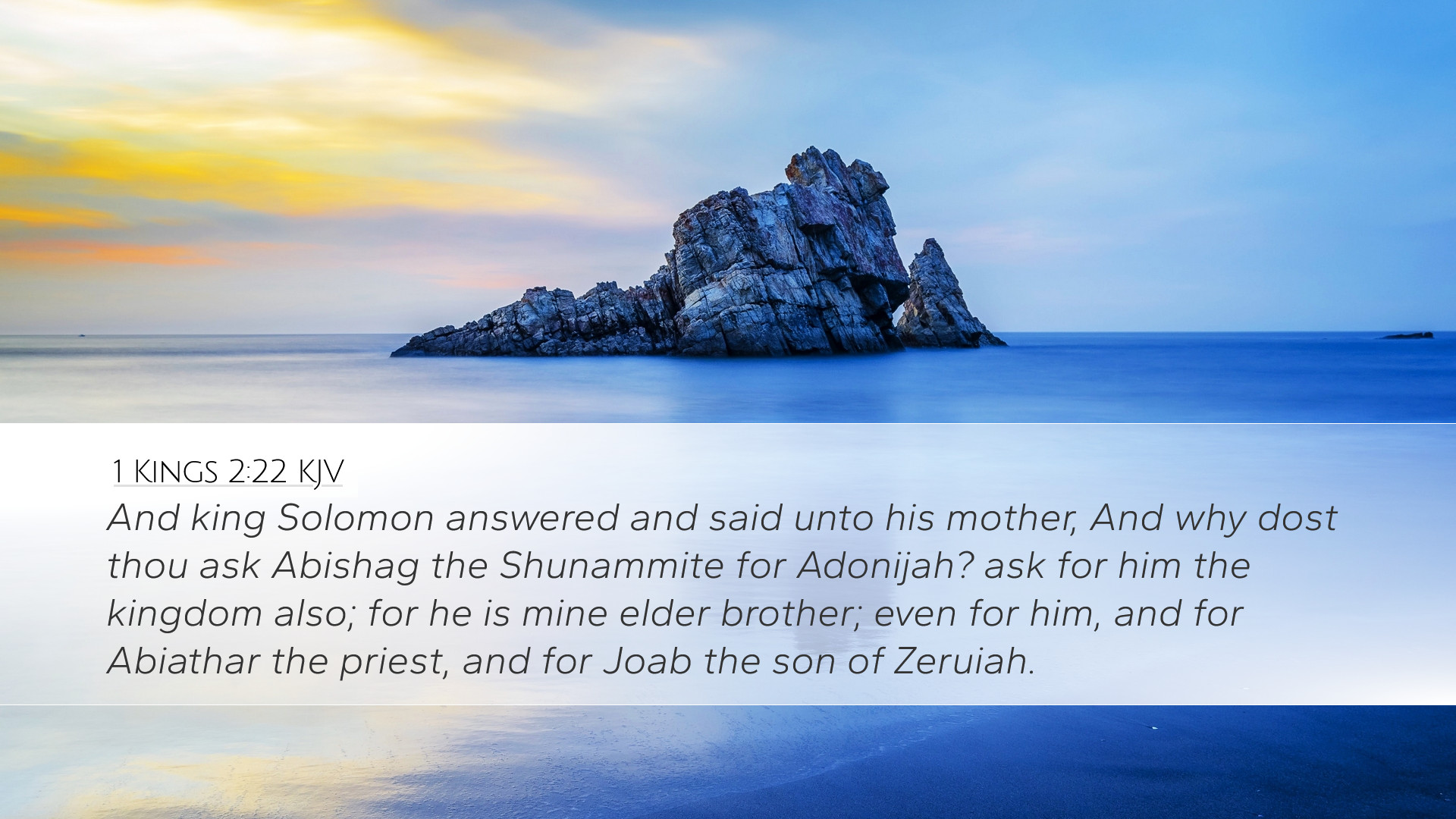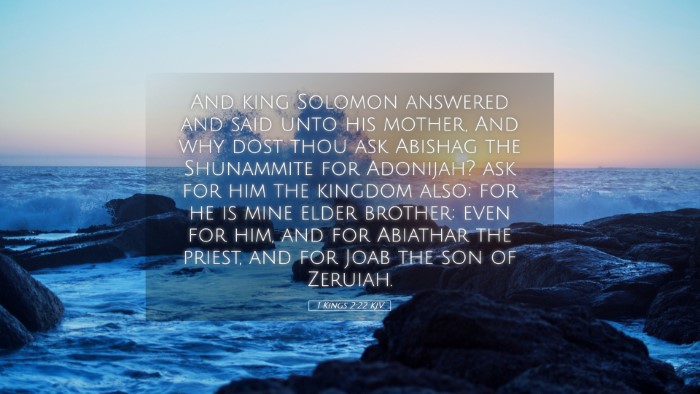Commentary on 1 Kings 2:22
Text of the Verse: "And King Solomon answered and said to his mother, 'Now why do you ask Abishag the Shunammite for Adonijah? Ask for him the kingdom also, for he is my older brother. For him and for Abiathar the priest and for Joab the son of Zeruiah.'"
Introduction
This verse occurs during a critical juncture in the early reign of King Solomon, where political maneuvering and familial tensions intertwine. Solomon's response to Bathsheba, his mother, reflects both the complexities of his position and the significant undercurrents of ambition and rivalry that characterized this period in Israel's history. Understanding the implications of this verse requires us to consider the cultural, political, and theological dimensions present in the narrative.
Contextual Analysis
Before delving into interpretations, it is crucial to understand the context surrounding this verse. Adonijah, Solomon's elder brother, had attempted to claim the throne following the death of their father, David. Despite his previous defeat and the anointing of Solomon as king, Adonijah seeks to regain favor by requesting Abishag, the virgin who cared for David, as his wife. This request is steeped in political significance, as marriage alliances were often used to solidify claims to power.
Political Dynamics
The request made by Adonijah signifies a challenge to Solomon's authority. As Matthew Henry notes, it is a “instance of the ambitious designs” that prioritized familial ties and personal ambition over loyalty to the newly established king. Solomon's immediate response tackles the heart of the matter: the implications of such a request threaten not only his reign but also the era of peace he aims to establish.
Solomon’s Response
Solomon's reaction is pivotal. He perceives Adonijah's request as an attempted coup, a power grab veiled in familial affection. Albert Barnes elucidates that Solomon’s retort—“Ask for him the kingdom also”—indicates the seriousness of the matter: if Adonijah desires Abishag, it could mean he also desires the throne. This underscores the delicate balance Solomon must maintain as he navigates familial loyalties while establishing his rule.
Divine Guidance
Solomon's kingship is not merely a result of human lineage but fulfills divine purpose, as highlighted by Adam Clarke. In this light, Solomon’s assertion that he was rightfully the king argues for a juxtaposition of human ambition against divine ordination. His wisdom—gleaned from God—becomes his guiding principle, leading to just and wise governance.
Theological Implications
This verse reveals much about the character of Solomon and the nature of leadership in the biblical narrative. The request from Adonijah invokes themes of rightful authority, the nature of kingship, and divine sovereignty. Solomon’s sharp reply indicates his awareness of the theological implications of leadership: it is not merely about ruling but serving under God’s authority.
Warning Against Ambition
The ambitions of Adonijah serve as a cautionary tale about the dangers of power and the human heart's propensity toward ambition. As per Matthew Henry's insights, this moment reflects the reality of fallen human nature, where aspirations can lead to discord and destruction. The narrative invites practitioners and scholars to contemplate their ambitions—are they aligned with God’s will or driven by personal desires?
Lessons for Leaders
For pastors, students, and theologians, the practical lessons from this verse extend to leadership within the church and community. Solomon exemplifies the importance of discernment—recognizing threats to one’s calling while embodying humility. Leadership rooted in prayerful dependence on God, as Solomon was advised before receiving wisdom, is an essential spiritual principle.
Call to Righteousness
Moreover, Solomon’s higher moral ground asserts that a leader must seek righteousness over personal loyalty. The tension between family ties and fidelity to God’s purpose becomes an essential reflection for contemporary leaders, encouraging them to prioritize their allegiance to Christ over human relations.
Conclusion
In sum, 1 Kings 2:22 is rich in its implications for understanding leadership, ambition, and divine purpose. The complexities in Solomon's response to his mother and brother are not merely historical records; they serve as vital lessons for modern readers on the nature of authority, the importance of discernment, and the necessity of aligning one's ambitions with God’s will. As one contemplates this verse, it is imperative to ask: How do our desires align with the kingdom of God?


